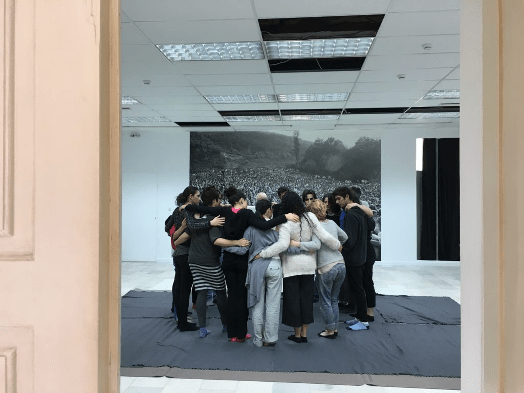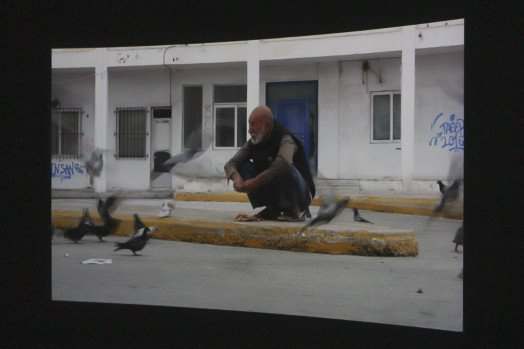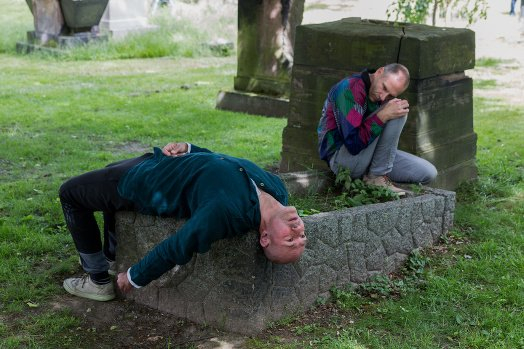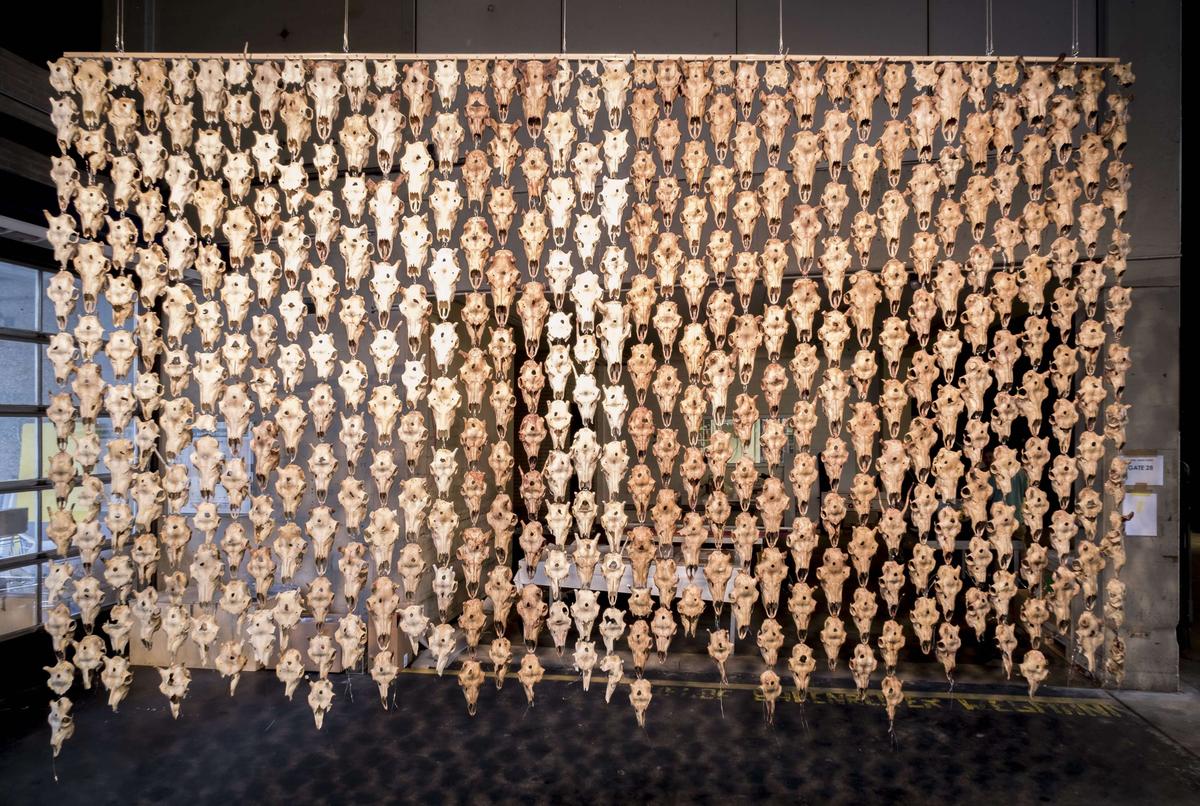It’s a mistake to think of documenta 14’s bifurcation as complimentary exhibition strategies. Such logic would pair off Athens as the exhibition’s precursor, its amuse bouche, introducing a series of problems (or taste accentuations to continue the metaphor) that would be latter reiterated, compounded, or resolved in Kassel. Rather, as the curators have been at pains to point out, the exhibition is simultaneous; stereoscopic rather than periscopic. Such a strategy eschews the implications of a hypothesis being tested out, of the exhibition functioning as a gathering of testimony that is merely steamrolled into that clarity of expression we expect so often. So, instead what we get is an exhibition at cross-purposes with itself. Often erasing as much it amplifies, this documenta unashamedly multiplies its contexts so that contrary to our presumptions meaning gets more complicated as our understanding proceeds. To borrow documenta’s phrasing it is a form of unlearning-relearning, which is itself borrowed from Cornelius Cardew whose presence within the exhibition is everywhere at once, stereoscopic, ruthlessly omnipresent, and yet never dictatorially so.
Of course the exhibition is repetitive. In Athens you don’t just meet one set of artists and in Kassel another. Works double up, presented here, presented there. Works change, unravel, adapt to the circumstances. Works traverse, like Ross Birrell’s horse trek from Athens to Kassel or Nikhil Chopra’s Drawing a Line through the Landscape (2017), a diaristic recounting of his caravanning from one city to another. Then there are also works that make use of the exhibition’s stereoscopic simultaneity, like David Lamelas’ live stream of Greek and German parliaments both in Athens and in Kassel. None though are more explicit about the potential of this simultaneous exhibition strategy than Georgia Sagri whose 6 day performance witnessed a 24/7 mobilisation of dancers and props throughout Athens and Kassel. As Adam Szymczyk pointed out, such a staging aimed precisely at the types of exhaustion, the ‘positive lobotomising’ of an unlearning, to unleash new methodologies, new forms of expression. Similarly Sagri herself suggested her performance enacted a constitutive act, one aimed not at the past/present/beyond taxonomies of a traditional story arc, but rather a durational, organisational co-presence. This then was aimed at a simultaneous now that shuns the types of zenned out bliss so characteristic of more solipsistic, therapeutic endeavours. Indeed, as Sagri further explained, and as her dancers enacted, time and again, there is a real mobility to the types of action that moves beyond a representational vortex to think instead in terms of collective mobility, of an action’s ability to articulate, not to express, but to join up, function with. Nowhere then was there a more ready embodiment of the type of borderless medium than in the manipulative unlearning practice of these contiguous bodies. Consequently, Sagri’s performers enacted the precipitative, process orientated occupation documenta’s unlearning aimed to foreground, re-orienting the empowered human-organism from representational maxims of identity to focus instead on the capacities of compositional enfranchisement.

Dynamis (Askese–on Empathy) with Georgia Sagri (Preparatory workshop). 2017
Such compositional matrixes, aligned as they are with a cosmopolitan embrace of co-presence, not only explains the curatorial choices of documenta but also goes a long way in explaining why the show isn’t just another reiteration of a by now overly familial adaption to postcolonial representation by Western institutions. Central to this is the overt presence of Athens in this matrix, particularly in the deliberate confrontation with the historical codification of Athens as the mythical crux of a hegemonic Western modernity. Indeed what this un-learning from Athens presents is precisely a historical reckoning of such ideologies particularly as they emerge in the contemporary moment, not just in the repression of indigenous knowledge systems, for instance, in Máret Ánne Sara’s account of Norway’s corralling of Sami reindeer practices, but in the rampant exploitative practices of a punitive form of Western capitalism whose extractive practices are particularly evident in contemporary Greece. Nowhere is this reworking of such privilege in favour of a cosmopolitan identity of co-presence, of a corporeal hospitality to otherness, more carefully elucidated than in Angela Melitopoulos’ work Crossings (2017), which deals in detail with the exclusionary and corruptive, corrupting practices of neoliberal capitalism and its continual obfuscation of neighbourliness in terms other than an incorporative, disjunctive opportunity to be exploited.

Crossings (2017) Angela Melitopoulos, Four-channel video and sixteen-channel sound installation, color, sound, 109 minutes
And yet Learning from Athens isn’t just the separation of a historical conjuring act that cemented a folk identity for a nascent form of entitlement that would encode Western democracy with a humanistic paradigm entirely removed from its egalitarian promulgations. Indeed, whilst there is plenty of recounting of that myth, particularly in the grouping of historical artefacts surrounding Johann Joachim Winckelmann and its pairing with Marshal Plan propaganda posters that celebrate a Europe rebuilt through the benefice of American largess, this isn’t where the story finishes. Indeed, we need only look at the way this story is entirely omitted in the contemporary failure of the E.U. to extend such generosity to Greece. This is keenly evident in Melitopoulos’ overlapping of two extractive economies, one historical, reliant on slave labour and a compliant hydrological manipulation of the environment, the other contemporary, reliant on the corrupting manipulative exploitation of a debt crisis and the constant marginalising and policing of private property for the benefit of the few. That such systems are unsustainable is a melancholy that suffuses Melitopoulos’ film, which is riven by the turmoil of displacement and of guerrilla agitation, both contemporary and historic. Riveted through both stories is the common lament of community organisations, eco-activist groups, refugee advocates and migrant narratives to reach beyond the opportunistic parasitism that treats the neighbour as an incorporative, exploitable site. And yet such melancholic narratives aren’t provided to ballast the sort of ressentiment so easily aroused by those messianic, nationalistic shamans like Marie Le Pen and Donald Trump but are instead aimed at a type of positive lobotomy, a squaring off of the cosmopolitan spirit, making the representative matrix of documenta’s exhibition complex that much more complicated. That is, if Melitopoulos’ splicing of the contemporary exploitation of Greece’s debt crisis as so much personal gain is a melancholic story, it’s the type of doom laden entreaty, that pessimistic embrace of a much wider crisis of identity that can’t escape itself. Here then the story isn’t just that simple breaking down of the Western complex in an attempt to remake it as new. No, it is precisely a type of complicity, a contiguous present that owns up to the parasitic abuse we heap upon one another. Which is why documenta isn’t necessarily just another reiteration of the familiar portrayal of one indigenous culture after another, that parade ground of difference to be all too readily incorporated.
Such jargon I will admit omits so much of the practicalities of the work on display and yet if we are to go beyond the therapeutic encounter of so much work that deals so explicitly with the inequity of the contemporary moment, that lists time and time again the mechanism and apparatus of repression and exploitation, then one must engage precisely with this underlying current of co-presence. Whether that’s oxymoronically evident in Mounira Al Solh’s Nassib’s Bakery (2017), which is deemed to have succeeded precisely because it was bombed out of existence, or the constant ability to turn this exodus from decency into a melancholic élan so omnipresent in the sound works no better expressed than in the hybridisation of Syrian Expat Philharmonic and the Athens State Orchestra joint performance of Henryk Gorecki’s Symphony of Sorrowful Songs (1976). Such melancholy is also evident in so much of the dance work presented, which eschews tidy narratives for more durational, overtly wandering and meandering acts of occupation, whether that’s Sagri’s, 24/7 mobilisation, or Maria Hassabi’s slowly contorting dancers. Perhaps the best encapsulation of such expression is Prinz Gholam’s solemn immersions in Athens’ iconic archaeological sites, their bodies merging so elementary with the cast aside, dormant stones, they too anticipate a future nobody knows about.

Speaking of Pictures (2017) Prinz Gholam, performance, Lutherplatz, Kassel, documenta 14, photo: Fred Dott
So yes, what to say? Athens is this documenta’s subject. Its foment and its solution. Indeed there’s no doubt that Athens is the exhibition’s aggrieved fulcrum, its matrix in which all the works spin. Does that exoticise Athens? Does that make Athens a case study? Most likely! There is plenty of talk out there about the exploitative nature of documenta in Athens. Of a crisis tourism. Of an extractive yolking of neoliberal capitalism’s embrace of the creative sector. And yet, there has to be a yolking of this narrative with the types of unlearning that the artists of documenta present time and time again. The point isn’t to suffuse ourselves in the grievances of the indigenous, nor in the manipulation of resentment by one charismatic leader after another. No. Something else is at stake here, something more sustaining, precisely because it refuses to tie itself up in the types of clarity we have always identified progress with. You could do worse then to ramble about Athens’ Filopappou hill and come across the pavilion housing Vivian Suter’s paintings, blowing in the breeze, so carefully orchestrating an improvisational aesthetic, a porous generative procreational idiom, which never seems to empty itself, but as the suffuse amount of paintings you encounter later in Kassel attests, continues on, one form after another, never extractive, never exhausting, just compositionally alert, co-present with a finality that ought to inspire in us a generosity that would better equip us as neighbours, hosts, commensals.
